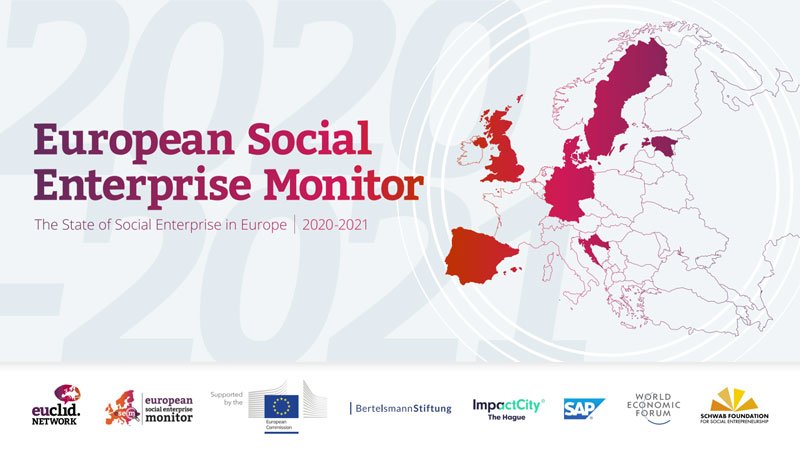Euclid Network (EN) in collaboration with organizations in eight European countries has published the first “European Social Enterprise Monitor” report (ESEM) – that collects data on social enterprises in the eight participating countries.
This happened at the European Commission’s European Social Economy Summit (#EUSES) on 26 May 2021.
The ESEM project was launched in 2020 and is the first survey for social enterprises to be conducted at European level. The project aims to address the current lack of data on social enterprises and to keep decision-makers in governments, civil society and actors in the economic system informed of the status of social enterprises.
The goal is that The goal is to communicate, support and promote the needs and interests of companies in the social and solidarity-based economy throughout Europe and elsewhere.
The ESEM study provides the data needed to make evidence-based policy-making, supports collaboration across Europe and disseminates best practice examples.
Results from the ESEM survey can be useful in decision making on both local to the national to the European level.
The European Social Economy Action Plan will also be strengthened through the insights and data provided by the ESEM project.
The ESEM project aims to include even more countries in the next ESEM study, that will start in September 2021.
Wieteke Dupain, who is the head of the ESEM project at Euclid Network says that decision-makers now have the opportunity to set the course for a more successful transition to a sustainable economic paradigm as the ESEM study provides insight into some of the most important organizational concepts, that can make this possible – the social entrepreneurship model ”.
The ESEM project builds on the success of previous studies and reports from Germany, the Netherlands and the United Kingdom. The national reports have provided detailed data on socio-economic enterprises and startups, which have led to important changes in policy formulation, investment decision-making and increased visibility and understanding of the social enterprise model and its crucial role in meeting the UN SDG´s.
Learning from the good experiences from the Netherlands, Germany and England and cooperating with leading academic institutions through the research group associated with the project, the ESEM survey has been designed and conducted in eight European countries in its first year.
The ESEM project is supported by the European Commission through the EaSI program and has received personal political support from Nicolas Schmit, EU Commissioner for Employment and Social Rights. Other partners who have helped develop the project is: Bertelsmann Stiftung, ImpactCity, SAP, the COVID Response Alliance for Social Entrepreneurs, the World Economic Forum and the Schwab Foundation.
The project consortium is led by the Euclid Network and consists of national network organizations for social enterprises, universities and research centers in eight European countries. Each country has a lead partner which is: Act Grupa (Croatia); Social Entrepreneurs in Denmark (Denmark); Social Enterprise Estonia (Estonia); Social Entrepreneurship Network Germany (SEND) (Germany); EsLider (Portugal); ESADE (Spain); Forum for Social Innovation (Sweden) and Social Enterprise UK (England). Research guidance is provided by Hertie School, Otto-von-Guericke-University of Magdeburg, Tallinn University, ESADE, Roskilde University, Católica Lisbon, University of Zagreb, Institute Ivo Pilar and Utrecht University.
The next European Social Enterprise Monitor survey 2021-2022 will be launched in September 2021, where new countries and country partners are expected to participate in the project.
If you run a social enterprise enterprise and want to make future ESEM reports even better, join the survey next time. You can sign up via this link to the Euclid Network website here
You can do so even though your country is not yet part of ESEM – Your contact info will be saved til your country is participating.
Read the European Social Enterprise Monitor Report 2020-2021 here
Read more about the ESEM project here
This publication has been prepared within SENBS project No. 2020- 1-EE01-KA204-077999. The content of this publication is the sole responsibility of the project coordinator and may not always reflect the views of the European Commission or the National Agency.
















Leave A Comment